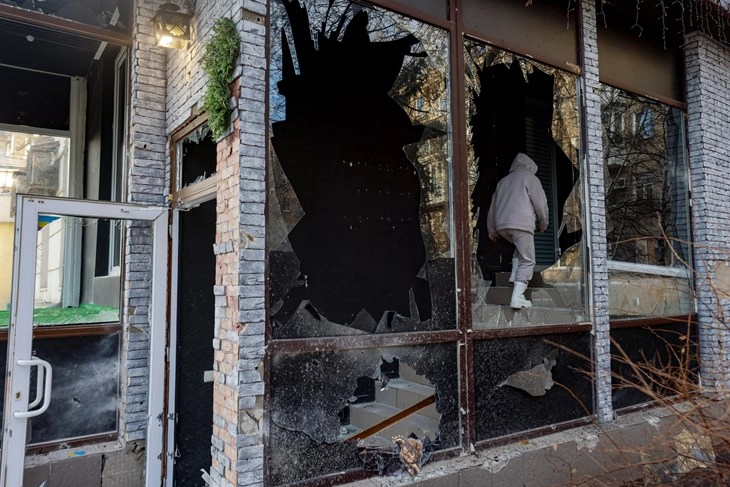Fighting continues in Ukraine, despite Christmas ceasefire
- Despite a unilateral ceasefire ordered by Russian President Vladimir Putin, Russia’s army said it had responded on Saturday to Ukrainian attacks during the Orthodox Christmas holiday.

Moscow, 7 January 2023 (dpa/MIA) – Despite a unilateral ceasefire ordered by Russian President Vladimir Putin, Russia’s army said it had responded on Saturday to Ukrainian attacks during the Orthodox Christmas holiday.
“All positions of the Ukrainian army from which shelling was carried out were knocked out by the Russian armed forces by returning fire,” said Russian Defence Ministry spokesman Igor Konashenkov.
Fighting occurred in the Donetsk, Kherson and Zaporizhzhya regions, according to the statement. Regardless, Konashenkov claimed Russia was abiding by the self-imposed 36-hour ceasefire, which was to officially end at 2100 GMT on Saturday.
Putin announced the temporary ceasefire on Thursday, citing Christmas, which many Orthodox Christians celebrate on January 6-7.
It would have been the first ceasefire along the entire front line since Russia began the war on February 24 last year.
Ukraine, however, rejected this as a hypocritical propaganda gesture and continued its attempts to recapture the occupied parts of the country. There could be no peace as long as Russian troops occupied Ukrainian territory, Kiev said.
Many international observers also doubted from the outset that the Russian weapons would really remain consistently silent. According to British intelligence, fighting continued at the usual level even during Orthodox Christmas.
Early on Saturday, Russian air defences once again repelled a drone attack on the Crimean peninsula, annexed by Moscow in 2014, state sources reported.
The unmanned aerial vehicle was shot down in the early morning over a breakwater near Sevastopol – the naval base of Russia’s Black Sea Fleet – the city’s Russian-appointed governor Mikhail Razvozhayev wrote on Telegram, according to state news agency TASS.
The port has been the target of Ukrainian drone attacks several times, most recently on January 4 when two drones were shot down.
Razvozhayev complained that even “holy Christmas” could not stop the “inhuman beings” from attacking his “heroic city.”
Russia supplies its occupying forces in southern Ukraine mainly via Crimea, so Ukraine repeatedly targets logistic and military objectives on the peninsula.
Moreover, winning back Crimea is one of Kiev’s declared goals as the Russian war has increasingly faltered in recent months.
Meanwhile on Saturday, Putin celebrated the first Orthodox Christmas since his army invaded Ukraine on the grounds of the Kremlin.
Photos and footage circulated by Russian state media showed the 70-year-old standing alone, in the presence only of church attendants, in the Cathedral of the Annunciation.
Putin, who ordered the invasion of the neighbouring country more than 10 months ago, said according to a Kremlin statement: “This bright, beloved holiday inspires people to good deeds and aspirations and serves to reaffirm in society imperishable spiritual values and moral guidelines such as mercy, compassion, kindness and justice.”
The war against Ukraine has already killed thousands of civilians and injured many more.
In recent months, the Russian army has been deliberately shelling the Ukrainian energy infrastructure, leaving many people without heating, electricity or water supplies during the cold winter months.
In Kiev, the new Orthodox Church of Ukraine held its first Christmas Mass in the contested Monastery of the Caves, a UNESCO World Heritage Site.
Several hundred believers, dozens of journalists and Culture Minister Oleksandr Tkachenko accepted the invitation to the service in the Cathedral of the Assumption. The service was broadcast live on Ukrainian television.
The Ukrainian Central Bank released figures late on Friday showing that the country had received the equivalent of more than $32 billion in aid and loans from abroad last year.
About 40% came from the United States, the Ukrainian central bank announced on Friday evening. Just under 25% came from the European Union and about 8% from the International Monetary Fund.
The total aid amounted to about 16% of Ukraine’s pre-war economic output.
However, Ukrainian gross domestic product collapsed by more than 30% in 2022 due to the war, according to estimates by the Economy Ministry in Kiev.
Ukraine is largely dependent on foreign aid, both financially and militarily.
In a major policy shift, the German government announced on Thursday that it would provide Ukraine with several dozen Marder infantry fighting vehicles and a Patriot air defence system, following agreements with Washington.
“Our ground forces will benefit enormously from the Marder infantry fighting vehicle,” Ukraine’s ambassador to Germany, Oleksii Makeiev, told the Wirtschaftswoche business weekly. He predicted that Western-designed battle tanks could follow.
“Even if it sounds strange to some: German weapons save lives and contribute to the return of peace in Europe,” Makeiev said.
In Belarus meanwhile, concerns are growing among the opposition about a possible mobilization in their country to support Russia’s war on Ukraine. The Belarusian border is only around 140 kilometres from the Ukrainian capital.
Preparations were well advanced, opposition politician Pavel Latushka, who lives in exile in Warsaw, told Germany’s media network Redaktionsnetzwerk Deutschland (RND) on Saturday.
Former culture minister Latushka is a member of opposition leader Svetlana Tikhanovskaya’s Cabinet in exile.







